The 4 Best Cottage Cheese Brands, Tested by EatingWell Dietitians & Editors
We tried 12 tubs of cottage cheese to find the tastiest ones—here are our top picks.
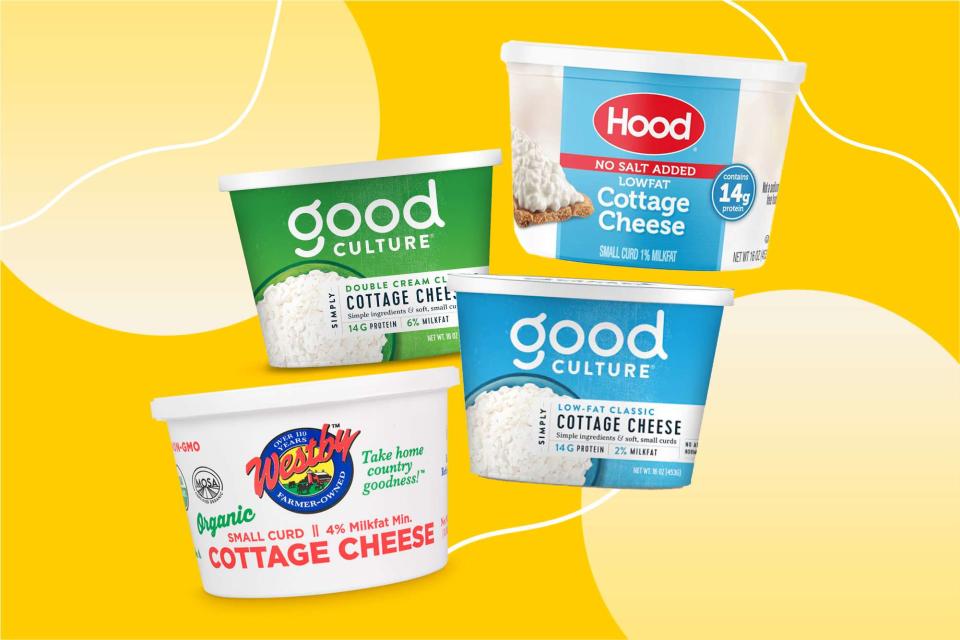
Reviewed by Dietitian Emily Lachtrupp, M.S., RD
If there's one dairy product on top of everyone's mind right now, it's cottage cheese. From ice cream to whipped dips, cottage cheese is being used in every possible way—and we couldn't be more excited. Not only is the spoonable dairy product delicious, but the curds are packed with protein, making it a healthy choice, too. To help you jump on this tasty trend, we put a dozen products to the test to find the very best cottage cheese.
For this test, we set nutrition parameters that reflected EatingWell's parameters for a healthy side dish. Each product had to meet the following nutrition requirements: 250 calories or less, 360 milligrams or less of sodium and 5 grams or less of added sugar per serving. Jessica Ball, M.S., RD, EatingWell's nutrition editor, explains, "Limiting the sodium to 360 milligrams per serving allows you to enjoy the flavor while aligning with the American Heart Association's recommendations of consuming, at most, 2,300 milligrams sodium per day."
After narrowing the field, we blind-tasted a dozen cottage cheese products. Keep reading to get all of our recommendations for the best cottage cheese.
Our Product Recommendations
Best Overall Cottage Cheese: Good Culture Double Cream Classic Cottage Cheese
Best Low-Fat Cottage Cheese: Good Culture Low-Fat Classic Cottage Cheese
Best Full-Fat Cottage Cheese: Westby Small Curd 4% Organic Cottage Cheese
Best No-Salt-Added Cottage Cheese: Hood No Salt Added Low Fat Cottage Cheese
Best Overall Cottage Cheese: Good Culture Double Cream Classic Cottage Cheese
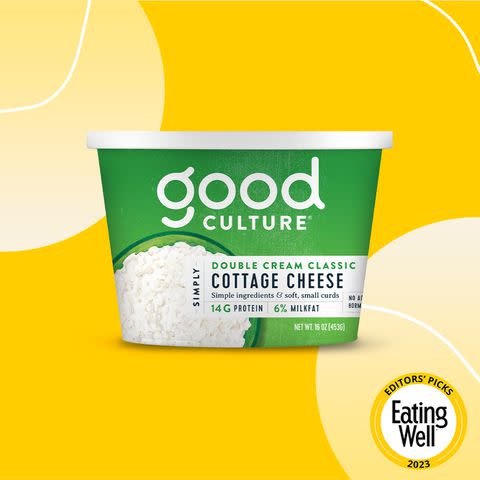
Good Culture stood out as the clear favorite across the board. Our testers enjoyed several of the brand's products, and its Double Cream Classic Cottage Cheese, which contains live and active cultures, scored best overall. This cottage cheese has 6% milkfat (FYI: Milk fat percentages refer to the amount of fat in the milk by weight), which gives it an uber-rich mouthfeel. This creamy cottage cheese has more liquid than others tested, but the visual difference didn't deter our testers from its excellent tangy flavor. While we wouldn't use this cottage cheese to make a sweet treat, our testers could imagine sprinkling it with za'atar and scooping it up with some veggies and crackers. The curds were also slightly chewy, which was a welcome texture after trying many others that were chalky and pasty.
Nutrition Info for Good Culture Double Cream Classic Cottage Cheese, per 1/2-cup serving
130 calories, 7 g total fat, 4 g saturated fat, 30 mg cholesterol, 340 mg sodium, 3 g carbohydrates, 0 g fiber, 3 g total sugar (0 g added sugar), 14 g protein
Best Low-Fat Cottage Cheese: Good Culture Low-Fat Classic Cottage Cheese
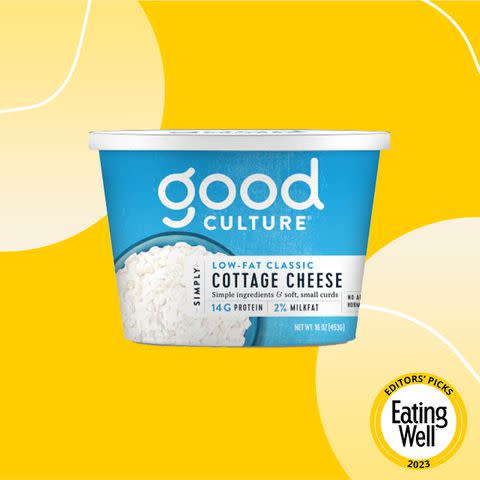
Another Good Culture favorite was the brand's Low-Fat Classic Cottage Cheese. This one has 2% milkfat, and all of our testers thought the cottage cheese had a nice, salty flavor. From a textural standpoint, the creaminess of the curds stood out. They were small and had a nice squeak, but weren't rubbery at all. The pleasant consistency was a key difference maker in the category, as other products tested had a gooey texture, according to our testers. This cottage cheese also has live and active cultures, so it contains probiotics.
Nutrition Info for Good Culture Low-Fat Classic Cottage Cheese, per 1/2-cup serving
80 calories, 2.5 g total fat, 1.5 g saturated fat, 15 mg cholesterol, 340 mg sodium, 3 g carbohydrates, 0 g fiber, 3 g total sugar (0 g added sugar), 14 g protein
Best Full-Fat Cottage Cheese: Westby Small Curd 4% Organic Cottage Cheese

Testers loved the expected salty, cheesy notes and pleasant tanginess of Westby's Small Curd 4% Organic Cottage Cheese. The tangy notes were well-balanced and added another layer of flavor. Plus, the texture was creamy and delicious. One tester, who enjoyed this product so much they took the leftovers home, liked that it was thicker and less watery than other ones we tried. The thickness of the cottage cheese makes it perfect for spooning over toast. We recommend topping with veggies and your favorite seasoning—everything bagel seasoning worked well for our tester—for an easy, protein-packed lunch. Bonus: This cottage cheese also has live active cultures and is certified kosher.
Nutrition Info for Westby Small Curd 4% Organic Cottage Cheese, per 1/2-cup serving
120 calories, 7 g total fat, 4 g saturated fat, 30 mg cholesterol, 340 mg sodium, 3 g carbohydrates, 0 g fiber, 2 g total sugar (0 g added sugar), 12 g protein
Best No-Salt-Added Cottage Cheese: Hood No Salt Added Low Fat Cottage Cheese
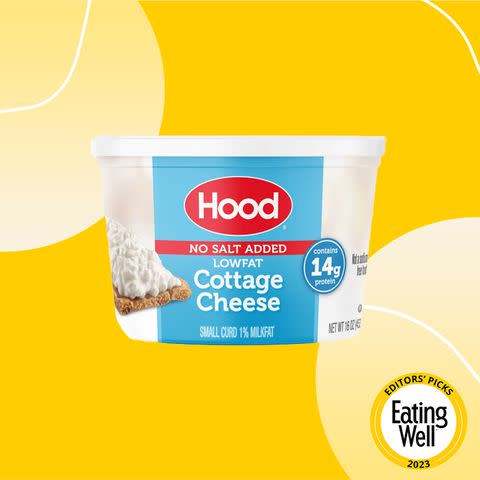
Cottage cheese can be high in sodium, so Hood's No Salt Added Low Fat Cottage Cheese is a great alternative if you're looking to watch your salt intake. The curds have a nice squeak and texture to them, although the product is more liquidy than creamy. With a mild tang and subtle flavor, our testers thought this cottage cheese would be well-suited as an ingredient in other recipes—including sweet treats like cinnamon rolls or savory dishes like lasagna or mac and cheese. If you want to enjoy it as is, our testers suggested serving with fresh fruit. Hood's availability in stores may differ, depending on your location.
Nutrition Info for Hood No Salt Added Low Fat Cottage Cheese, per 1/2-cup serving
90 calories, 1 g total fat, 0.5 g saturated fat, 15 mg cholesterol, 60 mg sodium, 6 g carbohydrates, 0 g fiber, 5 g total sugar (0 g added sugar), 14 g protein
The Bottom Line: The Best Cottage Cheese
If you're looking for a reliable product, Good Culture is an excellent choice for a low-fat cottage cheese or a double-cream cottage cheese. Or, if you'd rather buy a no-salt-added option, Hood's offering is a tasty choice.
Our Test
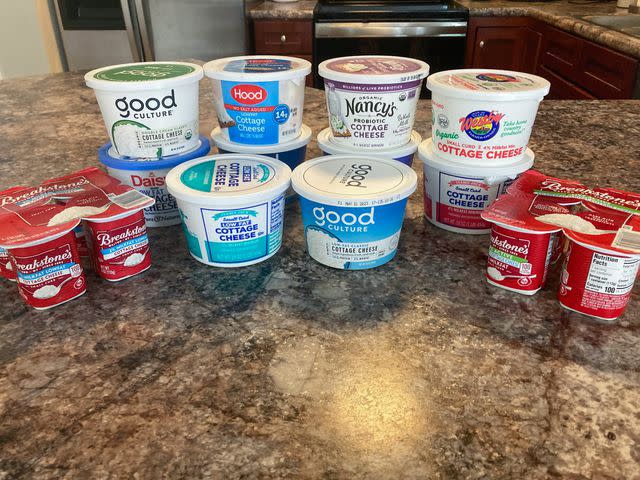
To narrow the field, we researched and read the labels of more than 60 products, and selected the ones that fit the following nutrition requirements: 250 calories or less, no more than 360 mg of sodium and less than 5 g added sugar. We looked at a range of products, including low-fat, whole and flavored. None of the flavored cottage cheese fit our nutrition requirements, so we didn't include any in our test. For the taste test, a blind tasting was set up with four testers. Each cottage cheese was eaten as is. Testers took notes regarding the taste, texture and appearance of each product and ranked their top choices.
Nutrition Parameters
For our nutrition parameters, we analyzed the numbers of products in the category. Each cottage cheese met the following criteria: ≤250 calories and ≤360 mg sodium. For flavored cottage cheese, we also included a limit of 5 g added sugar. These parameters are aligned with EatingWell's standards for a healthy side dish.
Frequently Asked Questions
Is Cottage Cheese Healthy?
Yes, cottage cheese is healthy, and it's an excellent source of protein. A 1/2-cup serving of cottage cheese contains about 12 g protein. "Cottage cheese is a great high-protein addition to any meal or snack," says Ball. The dairy product is also a good source of calcium, with a 1/2-cup serving containing 125 mg. That's about 12% of the daily recommended intake for adults aged 19 to 50. While cottage cheese has some great health benefits, there are a few factors to be mindful of that can impact nutrition.
Cottage cheese can be high in sodium, with some products containing as much as 490 mg per ½-cup serving. Eating too much salt can lead to bloating, headaches, high blood pressure and more. If you're concerned about sodium intake, choosing a no-salt-added cottage cheese is a great choice (we recommend Hood's product).
In addition to sodium, you'll want to be mindful of added sugars. While you won't find a product with zero grams total sugar (the lactose in milk naturally contains sugar), it's the added sugar content that can creep up, especially if you're buying a flavored cottage cheese. Eating too much added sugar can lead to obesity, diabetes and heart disease. Instead, we recommend buying a low-fat or whole-milk cottage cheese and topping it with fresh fruit. You'll still get the fruity flavor but will eliminate unnecessary added sugars.
Is It OK to Eat Cottage Cheese Every Day?
Yes, you can eat cottage cheese every day—however, it's important to eat a variety of foods on a regular basis to ensure that you aren't missing out on any nutrients. While cottage cheese does contain protein and calcium, there are other delicious calcium-rich foods you can try incorporating into your diet, including sardines and strained yogurt like Greek-style and skyr. If you do want to eat cottage cheese regularly, be mindful of your sodium and potential added sugar intake.
Is Cottage Cheese Good for Gut Health?
Cottage cheese may be good for gut health if it contains probiotics, but it depends on the product. Probiotics can help increase the good bacteria in your gut, which may lead to improved digestion. Look for cottage cheese labeled with "probiotics" or "live and active cultures" for a gut-friendly product, or try one of these foods to improve your gut health.
Our Trusted Expertise
Alex Loh is the associate food editor at EatingWell and has more than three years of experience with the brand. She has tested hundreds of products, from foods like hot dogs, oat milk and canned tuna to kitchen tools like salad spinners and sheet pans. For this article, she consulted with a registered dietitian and nutrition editor at EatingWell, Jessica Ball, M.S., RD, for her insights about nutrition. The testers included a registered dietitian and food editors.

